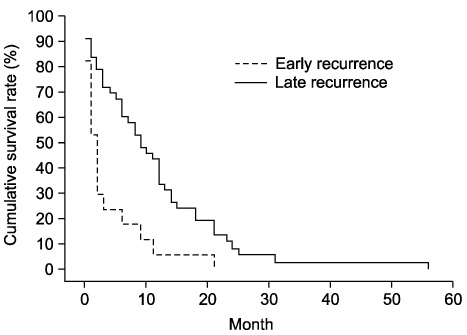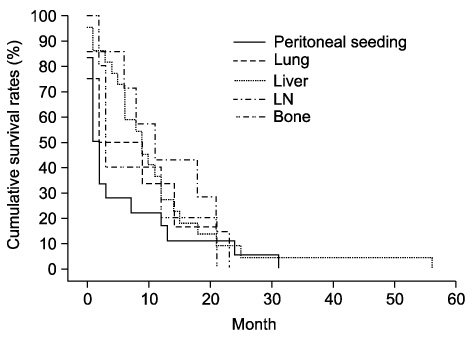J Korean Surg Soc.
2009 Dec;77(6):385-390. 10.4174/jkss.2009.77.6.385.
Clinicopathologic Evaluation of Patients with Recurrence of Gastric Cancer within 6 Months after Curative Resection
- Affiliations
-
- 1Department of Surgery, Kyung Hee University College of Medicine, Seoul, Korea. khjho@khmc.or.kr
- KMID: 1464817
- DOI: http://doi.org/10.4174/jkss.2009.77.6.385
Abstract
- PURPOSE
Evaluation of the clinicopathologic characteristics of recurred gastric cancer after curative resection is useful for detection of the recurrence and care thereof. The aim of this study was evaluating the characteristics of recurrence that occur less than 6 months after curative resection for gastric cancer.
METHODS
The study included 199 patients who recurred after curative gastrectomy that was performed in Kyung-Hee University Medical Center, from January 2000 to January 2008. Clinicopathologic findings were compared between 18 patients who recurred within 6 months after gastrectomy (early recurrence group) and 56 patients who recurred 2 years later (late recurrence group).
RESULTS
When compared with the late recurrence group, the early recurrence group was characterized by extended lymph node metastasis (P=0.005), advanced stage of disease (P=0.022), shorter survival period after recurrence (P=0.001), and more hepatic metastasis (P=0.008).
CONCLUSION
Patients with more advanced stages of disease or those with extended lymph node metastasis have a risk of early recurrence after curative gastrectomy. Clinicopathologic characteristics related to recurrence time of gastric cancer are important in detection and effective care of recurred gastric cancer.
Keyword
MeSH Terms
Figure
Cited by 1 articles
-
Clinicopathologic Characteristics of Gastric Cancer Patients according to the Timing of the Recurrence after Curative Surgery
Ji Yoon Choi, Tae Kyung Ha, Sung Joon Kwon
J Gastric Cancer. 2011;11(1):46-54. doi: 10.5230/jgc.2011.11.1.46.
Reference
-
1. Bozzetti F, Bonfanti G, Morabito A, Bufalino R, Menotti V, Andreola S, et al. A multifactorial approach for the prognosis of patients with carcinoma of the stomach after curative resection. Surg Gynecol Obstet. 1986. 162:229–234.2. Maruyama K. The most important prognostic factors for gastric cancer patients: a study using univariate and multivariate analyses. Scand J Gastroenterol. 1987. 22(s133):63–68.3. Adachi Y, Mori M, Maehara Y, Sugimachi K. Dukes's classification: a valid prognostic indicator for gastric cancer. Gut. 1994. 35:1368–1371.4. Shiraishi N, Inomata M, Osawa N, Yasuda K, Adachi Y, Kitano S. Early and late recurrence after gastrectomy for gastric carcinoma. Univariate and multivariate analyses. Cancer. 2000. 89:255–261.5. Papachristou DN, Fortner JG. Local recurrence of gastric adenocarcinomas after gastrectomy. J Surg Oncol. 1981. 18:47–53.6. Wu CW, Lo SS, Shen KH, Hsieh MC, Chen JH, Chiang JH, et al. Incidence and factors associated with recurrence patterns after intended curative surgery for gastric cancer. World J Surg. 2003. 27:153–158.7. Koga S, Takebayashi M, Kaibara N, Nishidoi H, Kimura O, Kawasumi H, et al. Pathological characteristics of gastric cancer that develop hematogenous recurrence, with special reference to the site of recurrence. J Surg Oncol. 1987. 36:239–242.8. Meyer HJ, Pichlmayr R. Patterns of recurrence in relation to therapeutic strategy in gastric cancer. Scand J Gastroenterol. 1987. 22(s133):45–48.9. Yoo CH, Noh SH, Shin DW, Choi SH, Min JS. Recurrence following curative resection for gastric carcinoma. Br J Surg. 2000. 87:236–242.10. Otsuji E, Kuriu Y, Ichikawa D, Okamoto K, Ochiai T, Hagiwara A, et al. Time to death and pattern of death in recurrence following curative resection of gastric carcinoma: analysis based on depth of invasion. World J Surg. 2004. 28:866–869.11. Sakar B, Karagol H, Gumus M, Basaran M, Kaytan E, Argon A, et al. Timing of death from tumor recurrence after curative gastrectomy for gastric cancer. Am J Clin Oncol. 2004. 27:205–209.12. Adachi Y, Oshiro T, Mori M, Maehara Y, Sugimachi K. Prediction of early and late recurrence after curative resection for gastric carcinoma. Cancer. 1996. 77:2445–2448.13. Maehara Y, Kakeji Y, Oda S, Takahashi I, Akazawa K, Sugimachi K. Time trends of surgical treatment and the prognosis for Japanese patients with gastric cancer. Br J Cancer. 2000. 83:986–991.14. Siewert JR, Bottcher K, Stein HJ, Roder JD. Relevant prognostic factors in gastric cancer: ten-year results of the German Gastric Cancer Study. Ann Surg. 1998. 228:449–461.15. Otsuji E, Kobayashi S, Okamoto K, Hagiwara A, Yamagishi H. Is timing of death from tumor recurrence predictable after curative resection for gastric cancer? World J Surg. 2001. 25:1373–1376.16. Davessar K, Pezzullo JC, Kessimian N, Hale JH, Jauregui HO. Gastric adenocarcinoma: prognostic significance of several pathologic parameters and histologic classifications. Hum Pathol. 1990. 21:325–332.17. Adachi Y, Yasuda K, Inomata M, Sato K, Shiraishi N, Kitano S. Pathology and prognosis of gastric carcinoma: well versus poorly differentiated type. Cancer. 2000. 89:1418–1424.18. Roukos DH, Lorenz M, Encke A. Evidence of survival benefit of extended (D2) lymphadenectomy in western patients with gastric cancer based on a new concept: a prospective long-term follow-up study. Surgery. 1998. 123:573–578.19. Otsuji E, Yamaguchi T, Sawai K, Hagiwara A, Taniguchi H, Takahashi T. Recent advances in surgical treatment have improved the survival of patients with gastric carcinoma. Cancer. 1998. 82:1233–1237.20. Gouzi JL, Huguier M, Fagniez PL, Launois B, Flamant Y, Lacaine F, et al. Total versus subtotal gastrectomy for adenocarcinoma of the gastric antrum. A French prospective controlled study. Ann Surg. 1989. 209:162–166.21. Macdonald JS, Smalley SR, Benedetti J, Hundahl SA, Estes NC, Stemmermann GN, et al. Chemoradiotherapy after surgery compared with surgery alone for adenocarcinoma of the stomach or gastroesophageal junction. N Engl J Med. 2001. 345:725–730.22. Sawai K, Takahashi T, Suzuki H. New trends in surgery for gastric cancer in Japan. J Surg Oncol. 1994. 56:221–226.23. Cavanna L, Artioli F, Codignola C, Lazzaro A, Rizzi A, Gamboni A, et al. Oxaliplatin in combination with 5-fluorouracil (5-FU) and leucovorin (LV) in patients with metastatic gastric cancer (MGC). Am J Clin Oncol. 2006. 29:371–375.24. Wisbeck WM, Becher EM, Russell AH. Adenocarcinoma of the stomach: autopsy observations with therapeutic implications for the radiation oncologist. Radiother Oncol. 1986. 7:13–18.25. Moriguchi S, Maehara Y, Korenaga D, Sugimachi K, Nose Y. Risk factors which predict pattern of recurrence after curative surgery for patients with advanced gastric cancer. Surg Oncol. 1992. 1:341–346.26. Noguchi Y. Blood vessel invasion in gastric carcinoma. Surgery. 1990. 107:140–148.
- Full Text Links
- Actions
-
Cited
- CITED
-
- Close
- Share
- Similar articles
-
- Clinicopathologic Characteristics according to the Type of Recurrence in Curatively-resected Gastric Cancer Patients
- Clinicopathologic Characteristics of Gastric Cancer Patients according to the Timing of the Recurrence after Curative Surgery
- Clinicopathologic Risk Factors of Hepatic Recurrence after Curative Resection for Gastric Cancer
- Therapeutic approach to non-curative resection after endoscopic treatment in early gastric cancer
- A Clinicopathological Analysis of Recurrent Gastric Cancer



